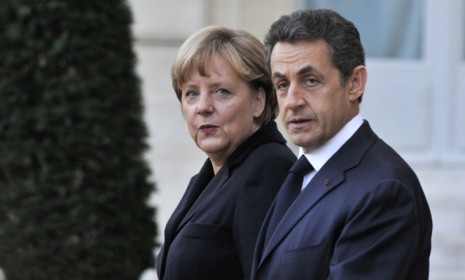Will the Merkel-Sarkozy plan fix Europe?
Europe's leaders move to impose fiscal discipline — just the sort of discipline that might have averted a debt crisis in the first place

A free daily email with the biggest news stories of the day – and the best features from TheWeek.com
You are now subscribed
Your newsletter sign-up was successful
On Monday, German Chancellor Angela Merkel and French President Nicolas Sarkozy unveiled a proposal to amend the European Union's governing treaties and impose greater central control over member nations' finances. Stocks ticked higher on the news, suggesting the plan made investors a little more optimistic that European leaders might find a way to dig out of their debt crisis. But the Standard & Poor's rating agency still issued a warning that it might downgrade the debt of 15 eurozone countries. Is a solution at hand, or is that just wishful thinking?
Finally, a promising plan: A cynic would say this is just another doomed "save the euro" plan, says Richard Quest at CNN. "But this one is different. For the first time," Europe's leaders are trying "seriously to tackle the underlying problem and create a 'fiscal compact' of better budgetary and management for the eurozone." We can't go "singing merrily down the road to recovery" — getting the squabbling 27 EU members to agree won't be easy — but this is a fine start.
"Europe's ship in The Doldrums as new plan airs"
The Week
Escape your echo chamber. Get the facts behind the news, plus analysis from multiple perspectives.

Sign up for The Week's Free Newsletters
From our morning news briefing to a weekly Good News Newsletter, get the best of The Week delivered directly to your inbox.
From our morning news briefing to a weekly Good News Newsletter, get the best of The Week delivered directly to your inbox.
But it's not a cure-all: The Merkel-Sarkozy plan, with its automatic fines on any nation with a deficit exceeding 3 percent of GDP, might force more governments to live within their means, says The Economist's Buttonwood blog. And that might convince the European Central Bank that it's safe to start buying up troubled nations' bonds again. But going forward, if Europe demands growth-stunting austerity programs and swears off haircuts like the ones Greece's lenders got, "how will the debt burdens be eroded?"
It's too early to pass judgment: This proposal can't "be called real" until the rest of the EU has its say at a Friday summit in Brussels, says The Wall Street Journal in an editorial. The compromise sets shared rules, but "leaves responsibility for balanced budgets with national parliaments." On its face, that's a "win for sovereignty." But remember, "it took only a few years for member states to start violating the EU's original budget rules, and it's not clear that they won't do so again."
"What Berlin and Paris wrought"
A free daily email with the biggest news stories of the day – and the best features from TheWeek.com
-
 The mystery of flight MH370
The mystery of flight MH370The Explainer In 2014, the passenger plane vanished without trace. Twelve years on, a new operation is under way to find the wreckage of the doomed airliner
-
 5 royally funny cartoons about the former prince Andrew’s arrest
5 royally funny cartoons about the former prince Andrew’s arrestCartoons Artists take on falling from grace, kingly manners, and more
-
 The identical twins derailing a French murder trial
The identical twins derailing a French murder trialUnder The Radar Police are unable to tell which suspect’s DNA is on the weapon